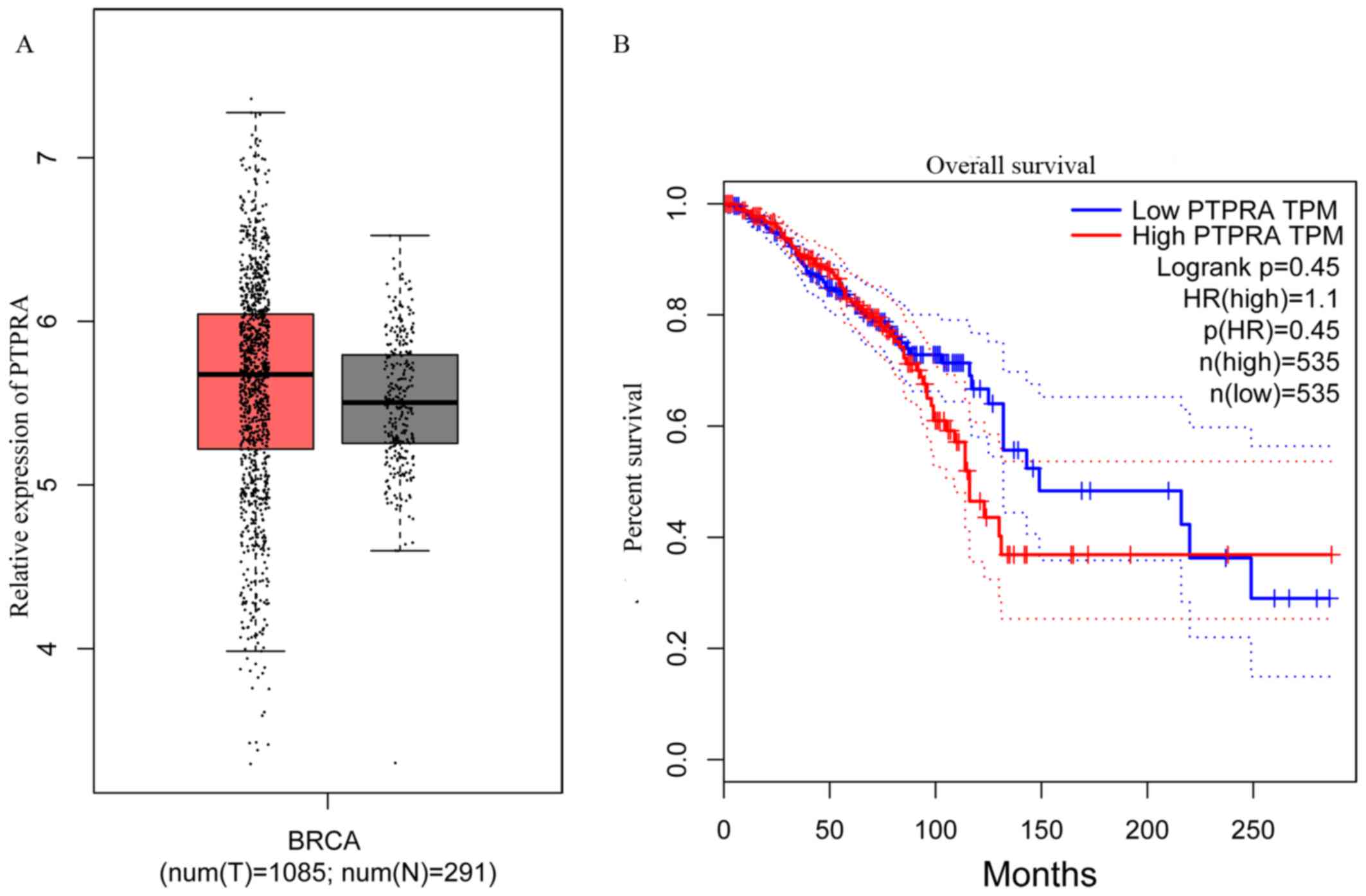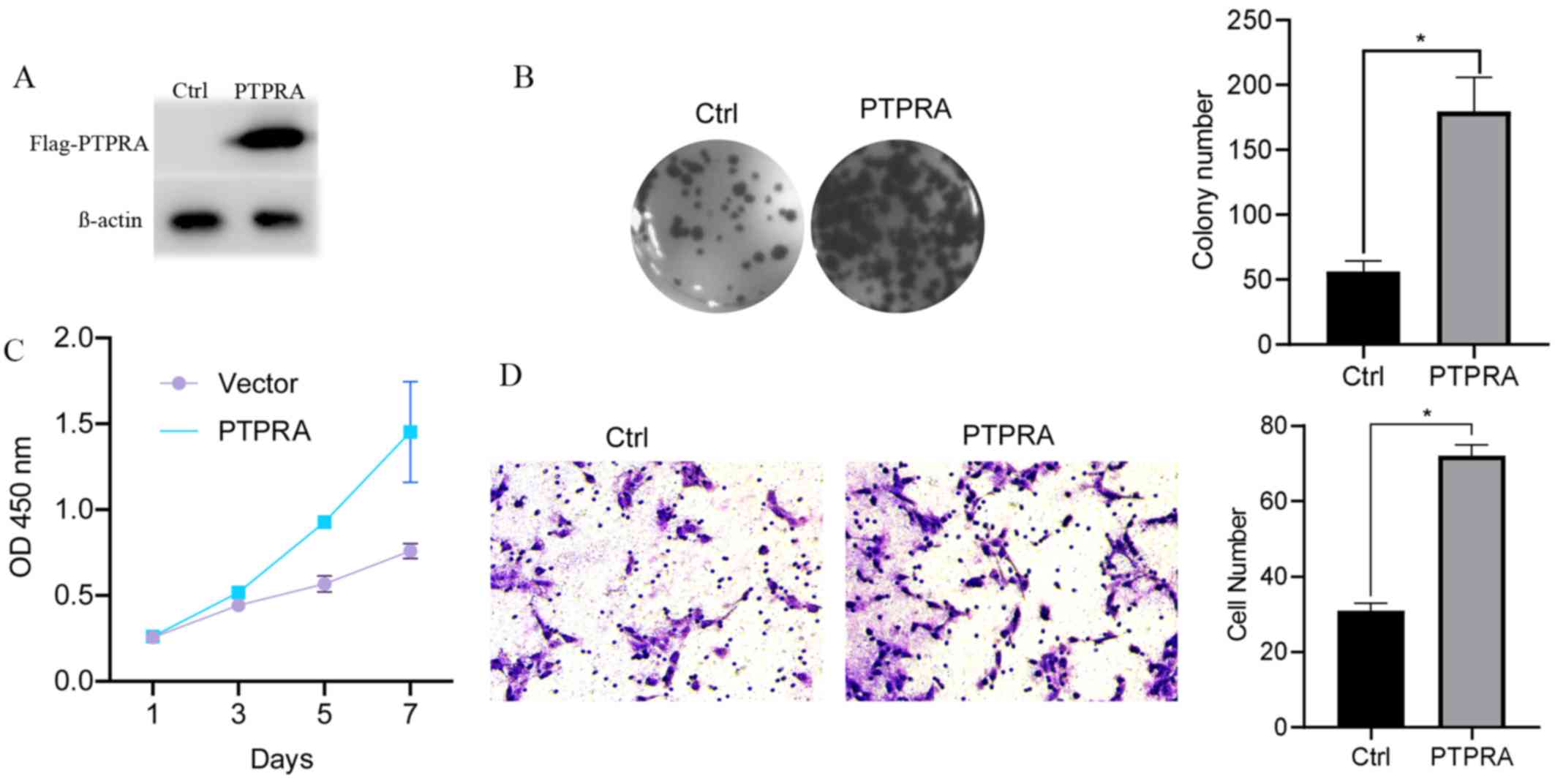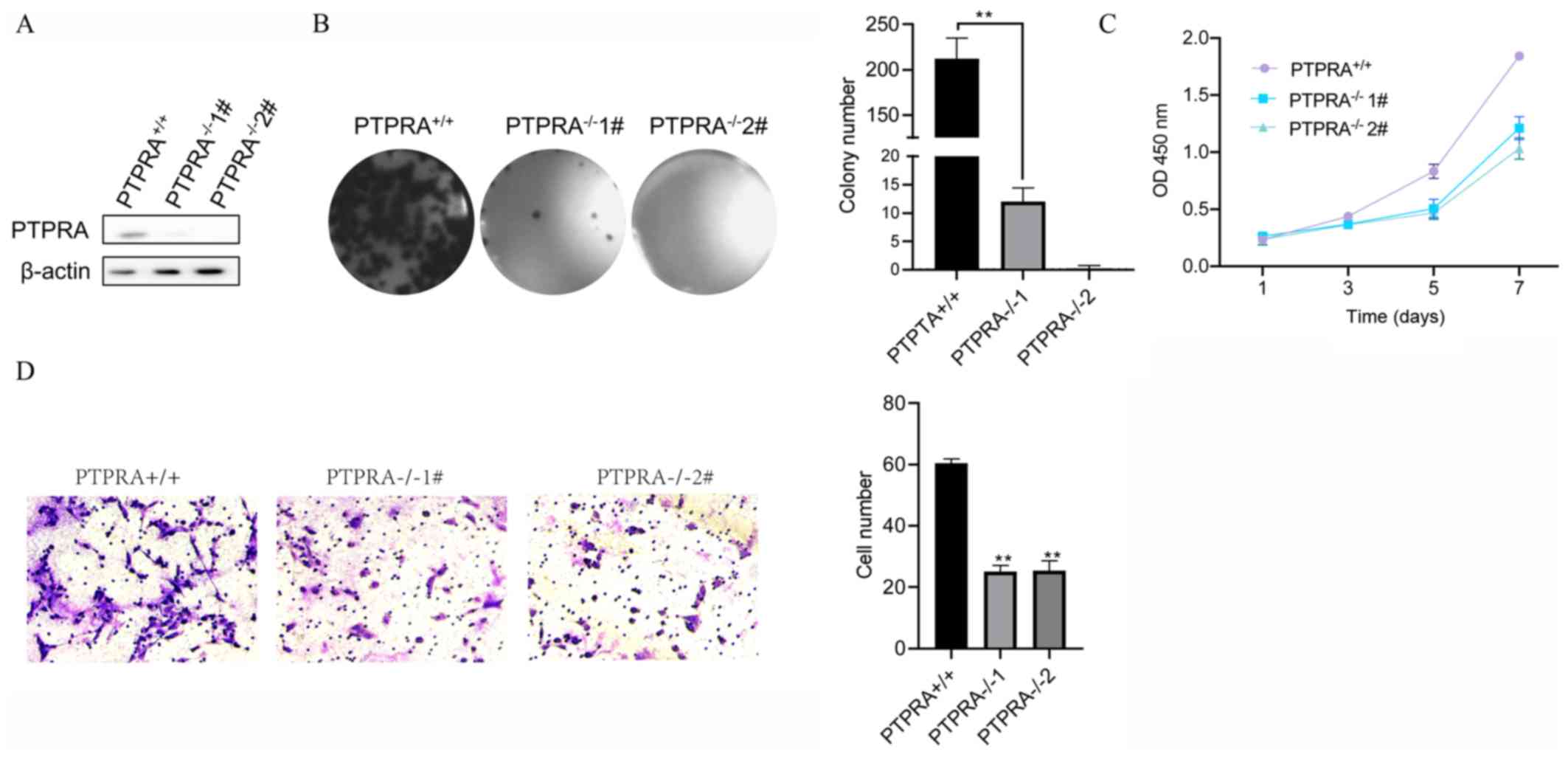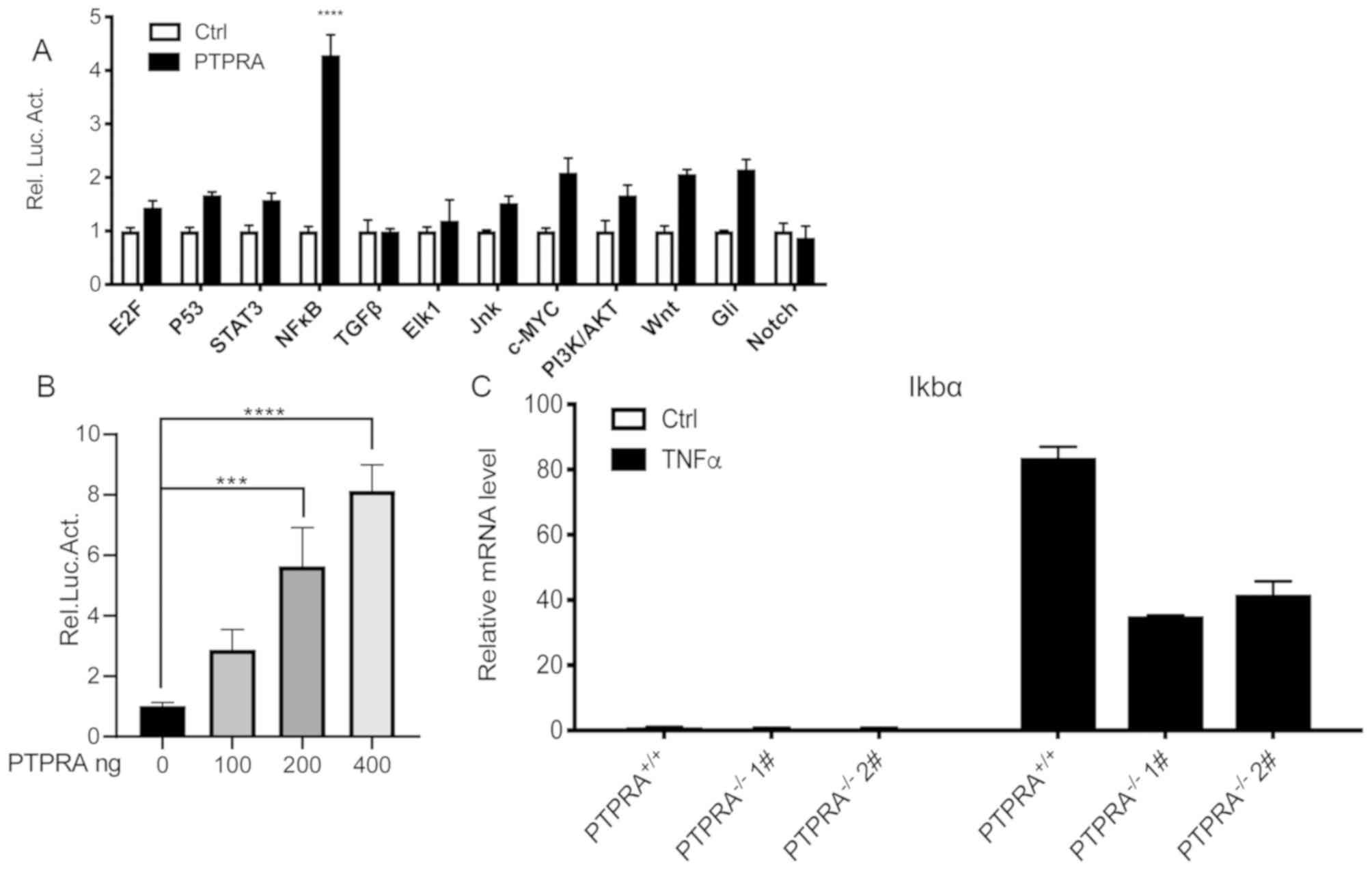|
1
|
DeSantis CE, Ma J, Gaudet MM, Newman LA,
Miller KD, Goding Sauer A, Jemal A and Siegel RL: Breast cancer
statistics, 2019. CA Cancer J Clin. 69:438–451. 2019. View Article : Google Scholar : PubMed/NCBI
|
|
2
|
Lin SX, Chen J, Mazumdar M, Poirier D,
Wang C, Azzi A and Zhou M: Molecular therapy of breast cancer:
Progress and future directions. Nat Rev Endocrinol. 6:485–493.
2010. View Article : Google Scholar : PubMed/NCBI
|
|
3
|
Ruvolo PP: Role of protein phosphatases in
the cancer microenvironment. Biochim Biophys Acta Mol Cell Res.
1866:144–152. 2019. View Article : Google Scholar : PubMed/NCBI
|
|
4
|
Merino Bonilla JA, Torres Tabanera M and
Ros Mendoza LH: Breast cancer in the 21st century: From early
detection to new therapies. Radiologia. 59:368–379. 2017.
View Article : Google Scholar : PubMed/NCBI
|
|
5
|
Ahmed M, Carrascosa LG, Ibn Sina AA,
Zarate EM, Korbie D, Ru KL, Shiddiky MJA, Mainwaring P and Trau M:
Detection of aberrant protein phosphorylation in cancer using
direct gold-protein affinity interactions. Biosens Bioelectron.
91:8–14. 2017. View Article : Google Scholar : PubMed/NCBI
|
|
6
|
Bollu LR, Mazumdar A, Savage MI and Brown
PH: Molecular pathways: Targeting protein tyrosine phosphatases in
cancer. Clin Cancer Res. 23:2136–2142. 2017. View Article : Google Scholar : PubMed/NCBI
|
|
7
|
Kim M, Morales LD, Jang IS, Cho YY and Kim
DJ: Protein tyrosine phosphatases as potential regulators of STAT3
signaling. Int J Mol Sci. 19:27082018. View Article : Google Scholar
|
|
8
|
Nunes-Xavier CE, Mingo J, López JI and
Pulido R: The role of protein tyrosine phosphatases in prostate
cancer biology. Biochim Biophys Acta Mol Cell Res. 1866:102–113.
2019. View Article : Google Scholar : PubMed/NCBI
|
|
9
|
Yao Z, Darowski K, St-Denis N, Wong V,
Offensperger F, Villedieu A, Amin S, Malty R, Aoki H, Guo H, et al:
A global analysis of the receptor tyrosine kinase-protein
phosphatase interactome. Mol Cell. 65:347–360. 2017. View Article : Google Scholar : PubMed/NCBI
|
|
10
|
Ardini E, Agresti R, Tagliabue E, Greco M,
Aiello P, Yang LT, Ménard S and Sap J: Expression of protein
tyrosine phosphatase alpha (RPTPalpha) in human breast cancer
correlates with low tumor grade, and inhibits tumor cell growth in
vitro and in vivo. Oncogene. 19:4979–4987. 2000. View Article : Google Scholar : PubMed/NCBI
|
|
11
|
Mei W, Wang K, Huang J and Zheng X: Cell
transformation by PTP1B truncated mutants found in human colon and
thyroid tumors. PLoS One. 11:e01665382016. View Article : Google Scholar : PubMed/NCBI
|
|
12
|
Chaudhary F, Lucito R and Tonks NK:
Missing-in-metastasis regulates cell motility and invasion via
PTPdelta-mediated changes in SRC activity. Biochem J. 465:89–101.
2015. View Article : Google Scholar : PubMed/NCBI
|
|
13
|
Sun PH, Ye L, Mason MD and Jiang WG:
Protein tyrosine phosphatase kappa (PTPRK) is a negative regulator
of adhesion and invasion of breast cancer cells, and associates
with poor prognosis of breast cancer. J Cancer Res Clin Oncol.
139:1129–1139. 2013. View Article : Google Scholar : PubMed/NCBI
|
|
14
|
Li J, Davidson D, Martins Souza C, Zhong
MC, Wu N, Park M, Muller WJ and Veillette A: Loss of PTPN12
stimulates progression of ErbB2-dependent breast cancer by
enhancing cell survival, migration, and epithelial-to-mesenchymal
transition. Mol Cell Biol. 35:4069–4082. 2015. View Article : Google Scholar : PubMed/NCBI
|
|
15
|
Sun PH, Ye L, Mason MD and Jiang WG:
Protein tyrosine phosphatase µ (PTP µ or PTPRM), a negative
regulator of proliferation and invasion of breast cancer cells, is
associated with disease prognosis. PLoS One. 7:e501832012.
View Article : Google Scholar : PubMed/NCBI
|
|
16
|
Meyer DS, Aceto N, Sausgruber N, Brinkhaus
H, Müller U, Pallen CJ and Bentires-Alj M: Tyrosine phosphatase
PTPα contributes to HER2-evoked breast tumor initiation and
maintenance. Oncogene. 33:398–402. 2014. View Article : Google Scholar : PubMed/NCBI
|
|
17
|
Xiao J, Gao Y, Yang F, Wang C, Xu Y, Chang
R, Zha X and Wang L: β1,6 GlcNAc branches-modified protein tyrosine
phosphatase alpha enhances its stability and promotes focal
adhesion formation in MCF-7 cells. Biochem Biophys Res Commun.
482:1455–1461. 2017. View Article : Google Scholar : PubMed/NCBI
|
|
18
|
Boivin B, Chaudhary F, Dickinson BC, Haque
A, Pero SC, Chang CJ and Tonks NK: Receptor protein-tyrosine
phosphatase alpha regulates focal adhesion kinase phosphorylation
and ErbB2 oncoprotein-mediated mammary epithelial cell motility. J
Biol Chem. 288:36926–36935. 2013. View Article : Google Scholar : PubMed/NCBI
|
|
19
|
Gu Z, Fang X, Li C, Chen C, Liang G, Zheng
X and Fan Q: Increased PTPRA expression leads to poor prognosis
through c-Src activation and G1 phase progression in squamous cell
lung cancer. Int J Oncol. 51:489–497. 2017. View Article : Google Scholar : PubMed/NCBI
|
|
20
|
Chen SC, Khanna RS, Bessette DC,
Samayawardhena LA and Pallen CJ: Protein tyrosine phosphatase-alpha
complexes with the IGF-I receptor and undergoes IGF-I-stimulated
tyrosine phosphorylation that mediates cell migration. Am J Physiol
Cell Physiol. 297:C133–C139. 2009. View Article : Google Scholar : PubMed/NCBI
|
|
21
|
Hou GX, Liu P, Yang J and Wen S: Mining
expression and prognosis of topoisomerase isoforms in
non-small-cell lung cancer by using oncomine and kaplan-meier
plotter. PLoS One. 12:e01745152017. View Article : Google Scholar : PubMed/NCBI
|
|
22
|
Lou W, Chen J, Ding B, Chen D, Zheng H,
Jiang D, Xu L, Bao C, Cao G and Fan W: Identification of
invasion-metastasis-associated microRNAs in hepatocellular
carcinoma based on bioinformatic analysis and experimental
validation. J Transl Med. 16:2662018. View Article : Google Scholar : PubMed/NCBI
|
|
23
|
Lou W, Liu J, Ding B, Chen D, Xu L, Ding
J, Jiang D, Zhou L, Zheng S and Fan W: Identification of potential
miRNA-mRNA regulatory network contributing to pathogenesis of
HBV-related HCC. J Transl Med. 17:72019. View Article : Google Scholar : PubMed/NCBI
|
|
24
|
Li SZ, Zeng F, Li J, Shu QP, Zhang HH, Xu
J, Ren JW, Zhang XD, Song XM and Du RL: Nemo-like kinase (NLK)
primes colorectal cancer progression by releasing the E2F1 complex
from HDAC1. Cancer Lett. 431:43–53. 2018. View Article : Google Scholar : PubMed/NCBI
|
|
25
|
Ran FA, Hsu PD, Lin CY, Gootenberg JS,
Konermann S, Trevino AE, Scott DA, Inoue A, Matoba S, Zhang Y and
Zhang F: Double nicking by RNA-guided CRISPR Cas9 for enhanced
genome editing specificity. Cell. 154:1380–1389. 2013. View Article : Google Scholar : PubMed/NCBI
|
|
26
|
Shen J, Cheng J, Zhu S, Zhao J, Ye Q, Xu
Y, Dong H and Zheng X: Regulating effect of baicalin on
IKK/IKB/NF-kB signaling pathway and apoptosis-related proteins in
rats with ulcerative colitis. Int Immunopharmacol. 73:193–200.
2019. View Article : Google Scholar : PubMed/NCBI
|
|
27
|
Livak KJ and Schmittgen TD: Analysis of
relative gene expression data using real-time quantitative PCR and
the 2(-Delta Delta C(T)) method. Methods. 25:402–408. 2001.
View Article : Google Scholar : PubMed/NCBI
|
|
28
|
Tang Z, Li C, Kang B, Gao G, Li C and
Zhang Z: GEPIA: A web server for cancer and normal gene expression
profiling and interactive analyses. Nucleic Acids Res. 45:W98–W102.
2017. View Article : Google Scholar : PubMed/NCBI
|
|
29
|
Li L, Tang P, Li S, Qin X, Yang H, Wu C
and Liu Y: Notch signaling pathway networks in cancer metastasis: A
new target for cancer therapy. Med Oncol. 34:1802017. View Article : Google Scholar : PubMed/NCBI
|
|
30
|
Liang J, Shi J, Wang N, Zhao H and Sun J:
Tuning the protein phosphorylation by receptor type protein
tyrosine phosphatase epsilon (PTPRE) in normal and cancer cells. J
Cancer. 10:105–111. 2019. View Article : Google Scholar : PubMed/NCBI
|
|
31
|
Tremper-Wells B, Resnick RJ, Zheng X,
Holsinger LJ and Shalloway D: Extracellular domain dependence of
PTPalpha transforming activity. Genes Cells. 15:711–724. 2010.
View Article : Google Scholar : PubMed/NCBI
|
|
32
|
!!! INVALID CITATION !!!
|
|
33
|
Nakano N, Itoh S, Watanabe Y, Maeyama K,
Itoh F and Kato M: Requirement of TCF7L2 for TGF-beta-dependent
transcriptional activation of the TMEPAI gene. J Biol Chem.
285:38023–38033. 2010. View Article : Google Scholar : PubMed/NCBI
|
|
34
|
Singha PK, Pandeswara S, Geng H, Lan R,
Venkatachalam MA and Saikumar P: TGF-β induced TMEPAI/PMEPA1
inhibits canonical Smad signaling through R-Smad sequestration and
promotes non-canonical PI3K/Akt signaling by reducing PTEN in
triple negative breast cancer. Genes Cancer. 5:320–336.
2014.PubMed/NCBI
|
|
35
|
Zhang L, Wang X, Lai C, Zhang H and Lai M:
PMEPA1 induces EMT via a non-canonical TGF-β signalling in
colorectal cancer. J Cell Mol Med. 23:3603–3615. 2019. View Article : Google Scholar : PubMed/NCBI
|
|
36
|
Zhang MH, Zhang HH, Du XH, Gao J, Li C,
Shi HR and Li SZ: UCHL3 promotes ovarian cancer progression by
stabilizing TRAF2 to activate the NF-kB pathway. Oncogene.
39:322–333. 2020. View Article : Google Scholar : PubMed/NCBI
|
|
37
|
Zhao X, Luo G, Fan Y, Ma X, Zhou J and
Jiang H: ILEI is an important intermediate participating in the
formation of TGF-β1-induced renal tubular EMT. Cell Biochem Funct.
36:46–55. 2018. View Article : Google Scholar : PubMed/NCBI
|
|
38
|
Zahid H, Simpson ER and Brown KA:
Inflammation, dysregulated metabolism and aromatase in obesity and
breast cancer. Curr Opin Pharmacol. 31:90–96. 2016. View Article : Google Scholar : PubMed/NCBI
|
|
39
|
Ghandadi M, Behravan J, Abnous K, Ehtesham
Gharaee M and Mosaffa F: TNF-α exerts cytotoxic effects on
multidrug resistant breast cancer MCF-7/MX cells via a
non-apoptotic death pathway. Cytokine. 97:167–174. 2017. View Article : Google Scholar : PubMed/NCBI
|
|
40
|
Bhatelia K, Singh K and Singh R: TLRs:
Linking inflammation and breast cancer. Cell Signal. 26:2350–2357.
2014. View Article : Google Scholar : PubMed/NCBI
|
|
41
|
Luo C and Zhang H: The role of
proinflammatory pathways in the pathogenesis of colitis-associated
colorectal cancer. Mediators Inflamm. 2017:51260482017. View Article : Google Scholar : PubMed/NCBI
|
|
42
|
Herrera Abreu MT, Penton PC, Kwok V,
Vachon E, Shalloway D, Vidali L, Lee W, McCulloch CA and Downey GP:
Tyrosine phosphatase PTPalpha regulates focal adhesion remodeling
through Rac1 activation. Am J Physiol Cell Physiol. 294:C931–C944.
2008. View Article : Google Scholar : PubMed/NCBI
|
|
43
|
Stanford SM, Svensson MN, Sacchetti C,
Pilo CA, Wu DJ, Kiosses WB, Hellvard A, Bergum B, Muench GRA, Elly
C, et al: Receptor protein tyrosine phosphatase α-mediated
enhancement of rheumatoid synovial fibroblast signaling and
promotion of arthritis in mice. Arthritis Rheumatol. 68:359–369.
2016. View Article : Google Scholar : PubMed/NCBI
|
|
44
|
Lai X, Chen Q, Zhu C, Deng R, Zhao X, Chen
C, Wang Y, Yu J and Huang J: Regulation of RPTPα-c-Src signalling
pathway by miR-218. FEBS J. 282:2722–2734. 2015. View Article : Google Scholar : PubMed/NCBI
|
|
45
|
Yuan BY, Chen YH, Wu ZF, Zhuang Y, Chen
GW, Zhang L, Zhang HG, Cheng JCH, Lin Q and Zeng ZC:
MicroRNA-146a-5p attenuates fibrosis-related molecules in
irradiated and TGF-beta1-treated human hepatic stellate cells by
regulating PTPRA-SRC signaling. Radiat Res. 192:621–629. 2019.
View Article : Google Scholar : PubMed/NCBI
|
|
46
|
Li L, Chen W, Liang Y, Ma H, Li W, Zhou Z,
Li J, Ding Y, Ren J, Lin J, et al: The Gβg-Src signaling pathway
regulates TNF-induced necroptosis via control of necrosome
translocation. Cell Res. 24:417–432. 2014. View Article : Google Scholar : PubMed/NCBI
|
|
47
|
Amoui M, Sheng MH, Chen ST, Baylink DJ and
Lau KH: A transmembrane osteoclastic protein-tyrosine phosphatase
regulates osteoclast activity in part by promoting osteoclast
survival through c-Src-dependent activation of NFkappaB and JNK2.
Arch Biochem Biophys. 463:47–59. 2007. View Article : Google Scholar : PubMed/NCBI
|


















